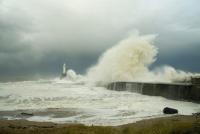The study, by researchers at Columbia University’s Centre for International Earth Sciences Information Network and the London-based International Institute for Environment and Development, is the first of its kind.
To be published in the peer-reviewed journal Environment and Urbanisation, the study assesses risks to populations and urban settlements along coastal areas less than 10 metres above sea level. Although this accounts for only two percent of the world’s land area, it contains 10 percent of the world’s population and 13 percent of the world’s urban population.
“Of the more than 180 countries with populations in the low-elevation coastal zone, 130 of them – about 70 percent – have their largest urban area extending into that zone,” said Bridget Andersen, a research associate at CIESIN. “Furthermore, the world’s largest cities – those with more than five million residents – have on average one-fifth of their population and one-sixth of their land area within this coastal zone.”
Subscribe to our newsletter
Stay up to date with DeSmog news and alerts







